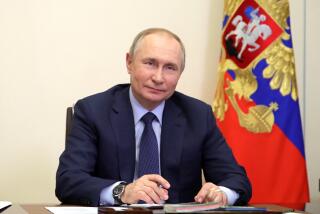Dmitry Dudko, 82; Priest, Critic of Soviet Atheism
- Share via
Russian Orthodox priest Dmitry Dudko, an outspoken critic of Soviet atheism who spent eight years in a Siberian labor camp in the 1950s, died Monday in Moscow, the Moscow Patriarchate announced. He was 82.
“Father Dudko was a leader in the field of religious rights in Russia. He gave people hope,” Father Victor Potapov, rector of St. John the Baptist Russian Orthodox Cathedral in Washington, said Friday. Potapov, a member of the Russian Orthodox Church Outside of Russia, interviewed Dudko several times in the 1970s and ‘80s for a “Voice of America” radio program he hosts.
Dudko’s regular sermons and newsletters about Christianity, considered propaganda by the Soviet state, made him a mentor for many Soviet dissidents in the 1970s, including the late physicist Andrei Sakharov, Potapov recalled.
His best-known book, “Our Hope” (1973), is a collection of his sermons published in English by St. Vladimir’s Seminary Press, near New York City. In it he often repeated that religious faith was difficult.
“We consider an easy life the height of blessedness,” Dudko wrote in one sermon. “But let’s be critical of ourselves.... In order to renew all things we’ve got to become ascetics.”
From his earliest years as a student at the Moscow Theological Academy, Dudko wrote religious poetry that circulated in the Russian underground press. He was arrested for his writing in 1948 and sent to a gulag.
Eight years there did not silence him, and in 1974 he was arrested again after a series of question-and-answer sessions with members of his congregation in which he described life in the work camps, police brutality and other experiences.
Two plainclothes agents led him away from the church in May 1974. He was later released and transferred to a rural parish, but after 18 months there he was arrested again after texts of his sermons were circulated in underground publications.
He was quoted in one publication as saying: “I do not oppose Soviet power as the [security police] would have me believe. I have simply seen clearly the impasse that the world faces without Christ.”
He referred to alcoholism, divorce and strained family relations as results of atheism. “I see the vices that scar the faces of our people. And you order me to be silent?”
He was arrested again in the winter of 1980 and wasn’t seen again until June 1980, when Soviet television aired a half-hour interview in which he denounced his earlier work.
His defenders said he had been subjected to drug treatments that caused an abnormal state and led to his decision to renounce his earlier writings.
“No one in the West condemned him for it,” Potapov said. “He was put under enormous pressure, and he broke.”
Dudko would be harassed by government agents until the collapse of the Soviet Union.
While he is credited with helping undercut the Soviet regime, once it fell he was critical of democratic reformers and Western capitalists.
More to Read
Sign up for Essential California
The most important California stories and recommendations in your inbox every morning.
You may occasionally receive promotional content from the Los Angeles Times.













